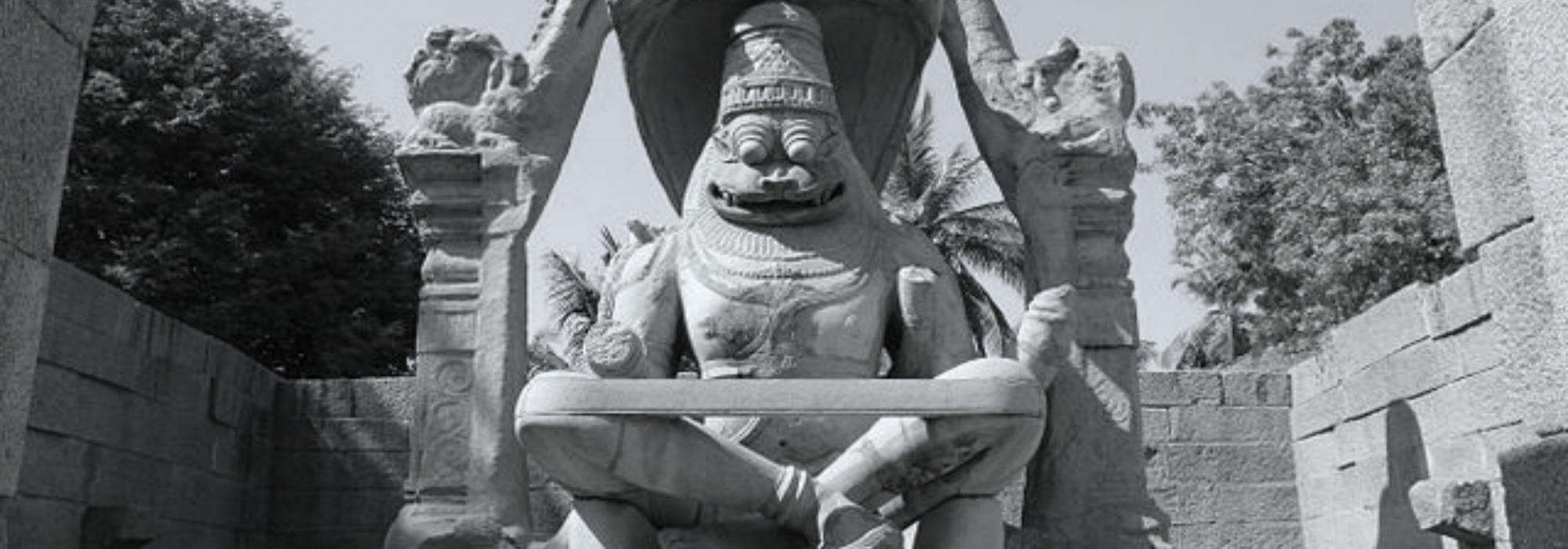पूषवाडान्वयाब्धीन्दो स्वस्ति नारायणप्रभो |
नेत्रे गात्रे तथा श्रोत्रे वक्त्रे पुष्पेषुशोभ ते ||
Once, a scholar visited the court of Nārāyaṇa Gaṇapati, the provincial ruler of Andhra’s Vijayanagar empire. He gave a discourse on dvaita vedānta and maintained that the Vedas stand proof for the authenticity of the dvaita principle. He even quoted several phrases from the Vedas to substantiate his stand. Finally he even declared “भिधा सत्यं भिधा सत्यम्” (“Difference is the Truth, Difference is the Truth”) along with three-tried tonal variation (trai-svarya) of the Vedas. It was actually a phrase that he had invented and had given it a vedic clothing. Maṅgaleśvara-śāstri, who had discreetly come to the court, caught the subtlety in his words and said aloud “भिधा सत्यमिति यो वदति स चण्डालो भवति स चण्डालो भवति स चण्डालो भवति”. He uttered this in the vedic-style too along with the trai-svarya. The court was stunned and only then did it realize the presence of Maṅgaleśvara-śāstri. The king, who had only heard about Maṅgaleśvara-śāstri, was impressed and honoured him. When the king asked him the source of the phrase that he had uttered, Śāstri said “Revered king ! What both of us said is a phrase from the Veda. Probably that pundit does not know where exactly those phrases are found in the Vedas. What he said is in fact a sentence of the ‘pūrva-pakṣa’ and what I said was the siddhānta (the established theory). He probably has read only the portions until the pūrva-pakṣa, a pity indeed! You may ask him where the phrase he quoted occurs – in name of the saṃhitā, the kāṇḍa number and the prapāṭhaka”. The scholar was caught on his lips and was embarrassed.
The king and the court understood the import of what Maṅgaleśvara-śāstri said and they felicitated him. The current verse was then said extempore by him, as words of blessing to the king –
“You, who are like the moon to the sea of the Pūṣavāḍa clan! Nārāyaṇa-prabhu, you are like the cupid (manmatha). Best wishes to you, king ! You are a great leader, a good listener and a nice speaker. You are famous too!”
Although the meaning of this verse is simple, there is a nice play on words here. The words netre, gātre, śrotre and vaktre appear as the forms of a akārānta noun in the saptamī-vibhakti (the 7th case), but really are caturthī-vibhakti (4th case) forms of ṛkārānta nouns. Moreover, when as ‘puṣpeṣuśobha te’ is read as ‘puṣpeṣu-śobhate’, without taking out the ‘te’ as caturthī-vibhakti singular, the verse takes a completely different meaning –
“Oh king! There are flowers adorning in your eyes, body, ears and mouth”
Such ‘apavākyābhāsa’, i.e., composing a verse that gives an illusion of two different meanings, one being senseless, shows the command that Maṅgaleśvara-śāstri had over the language. The person who composes the verse and tells its meaning gives the illusion to the listeners that he is making a mistake, while he is conscious of what he is doing. In the end, it doubly astonishes the audience!
Adapted from Kannada by Arjun Bharadwaj
(The original article is from the anthology Kavitegondu Kathe)








































